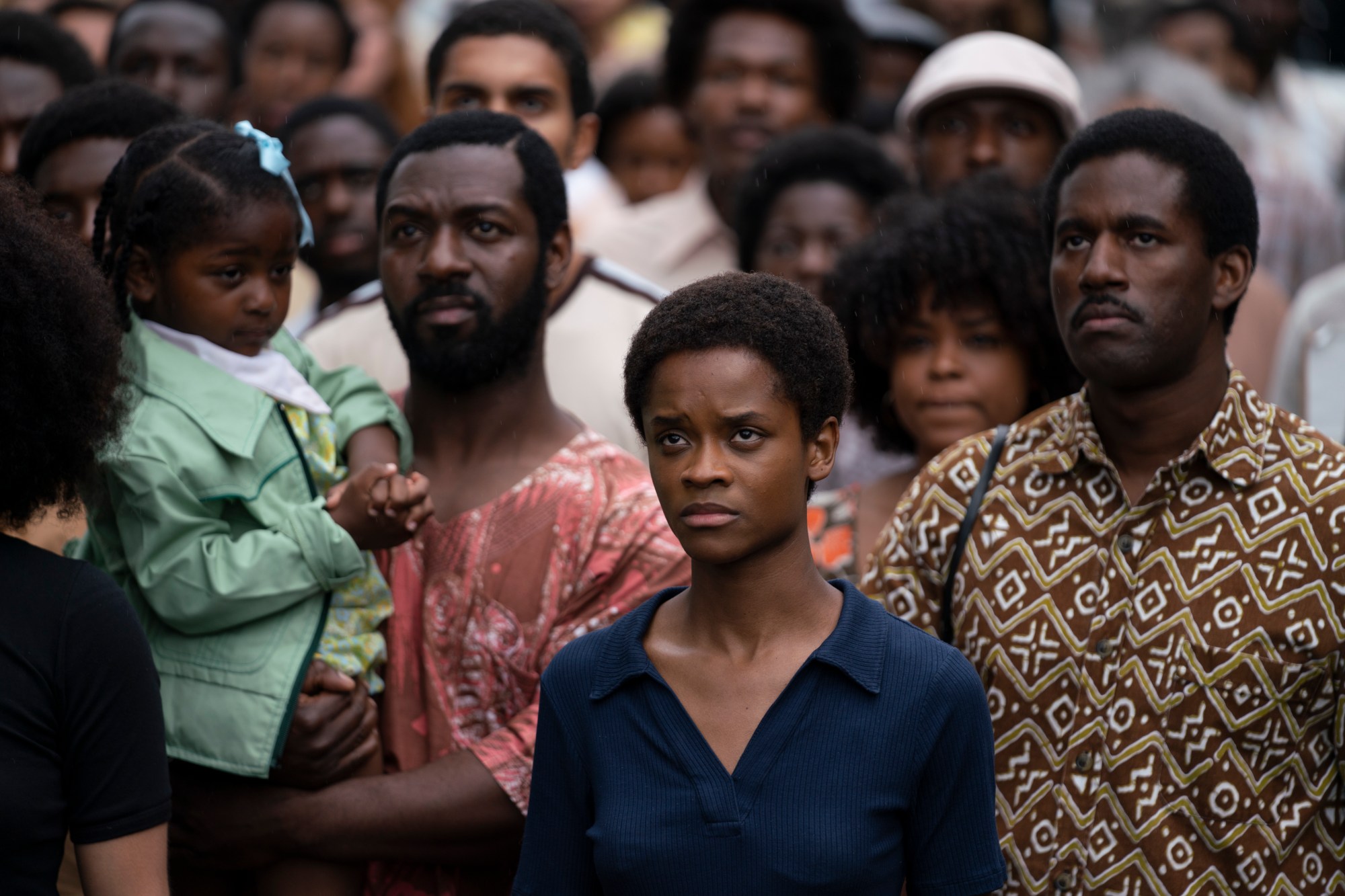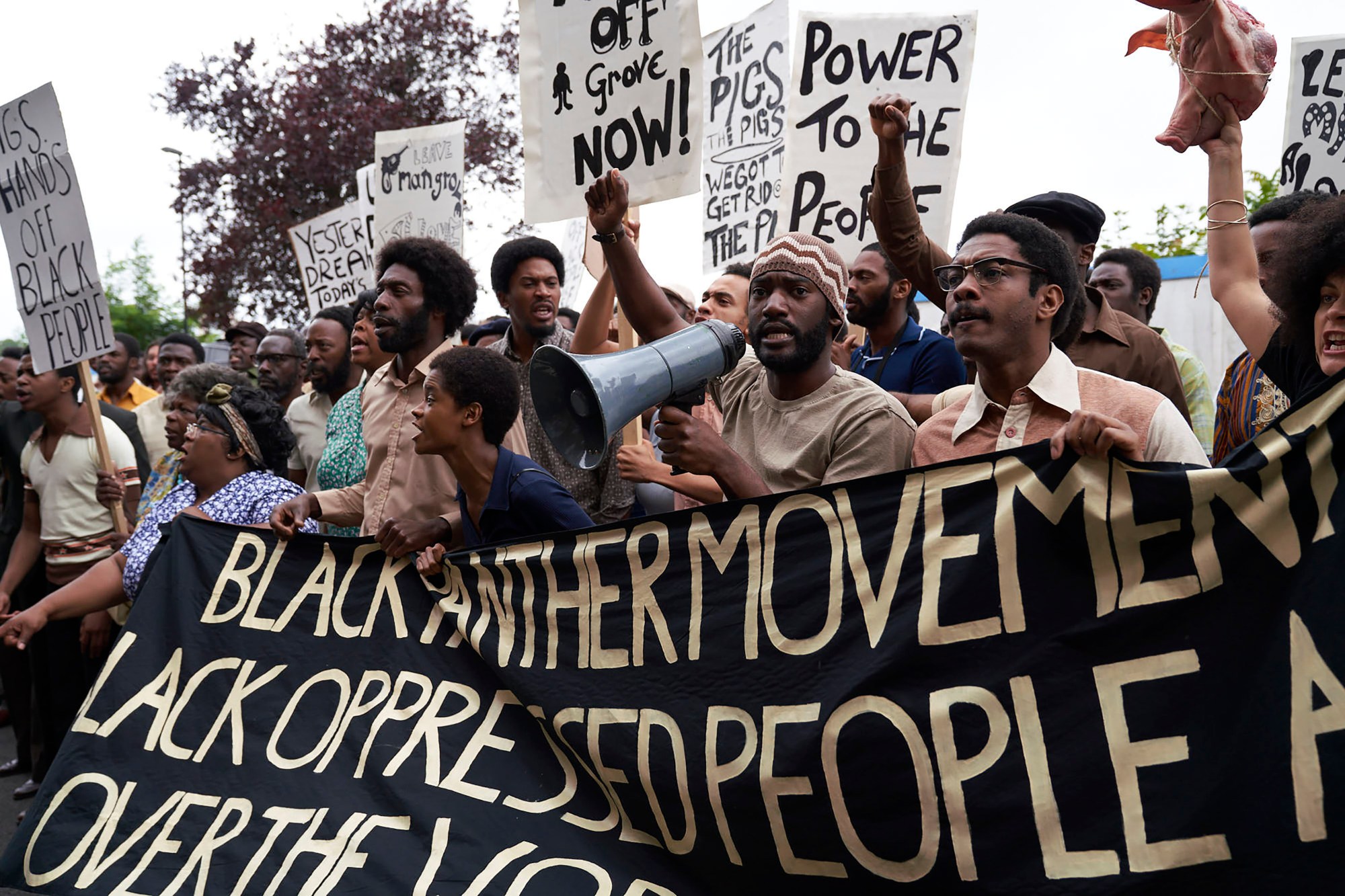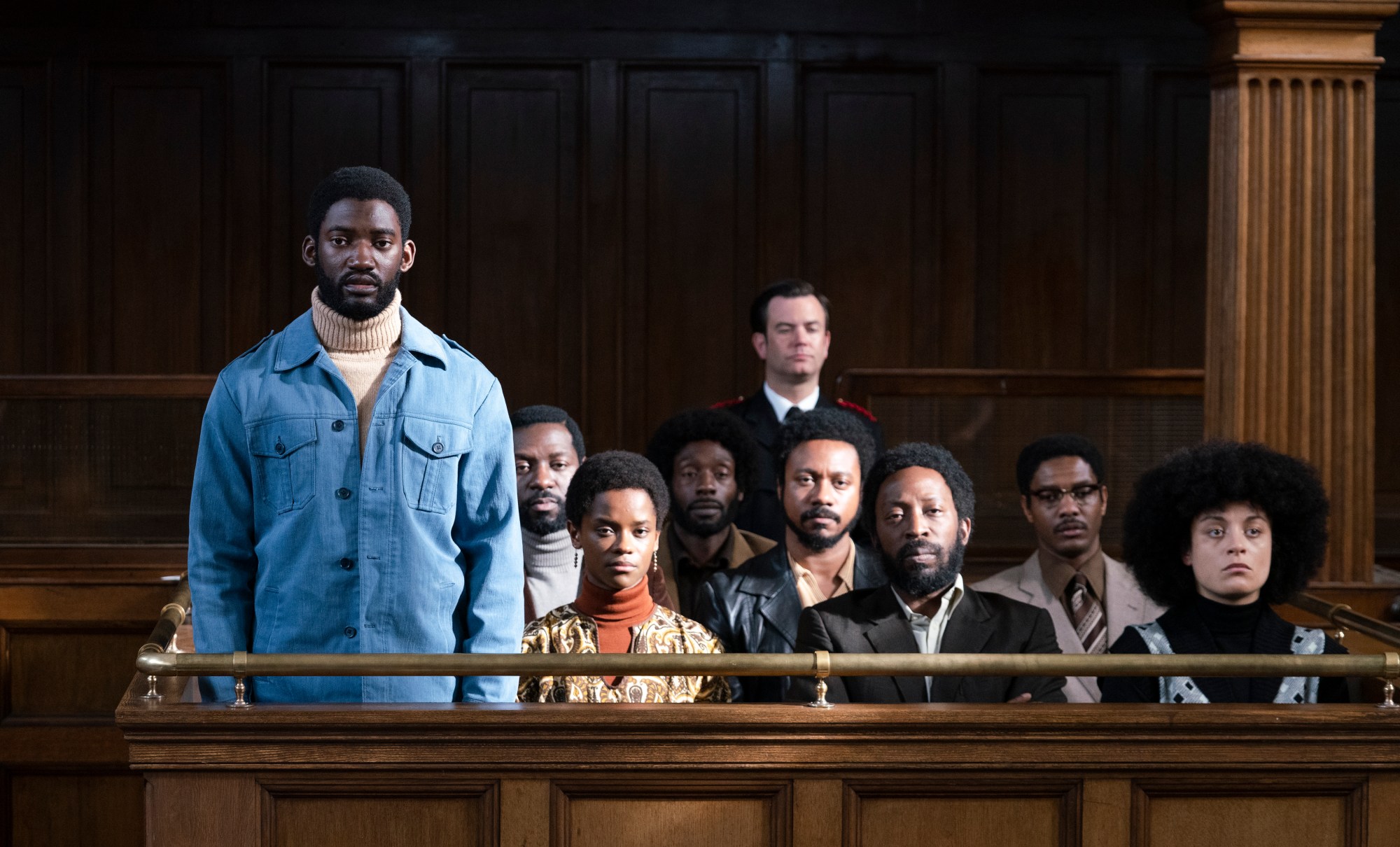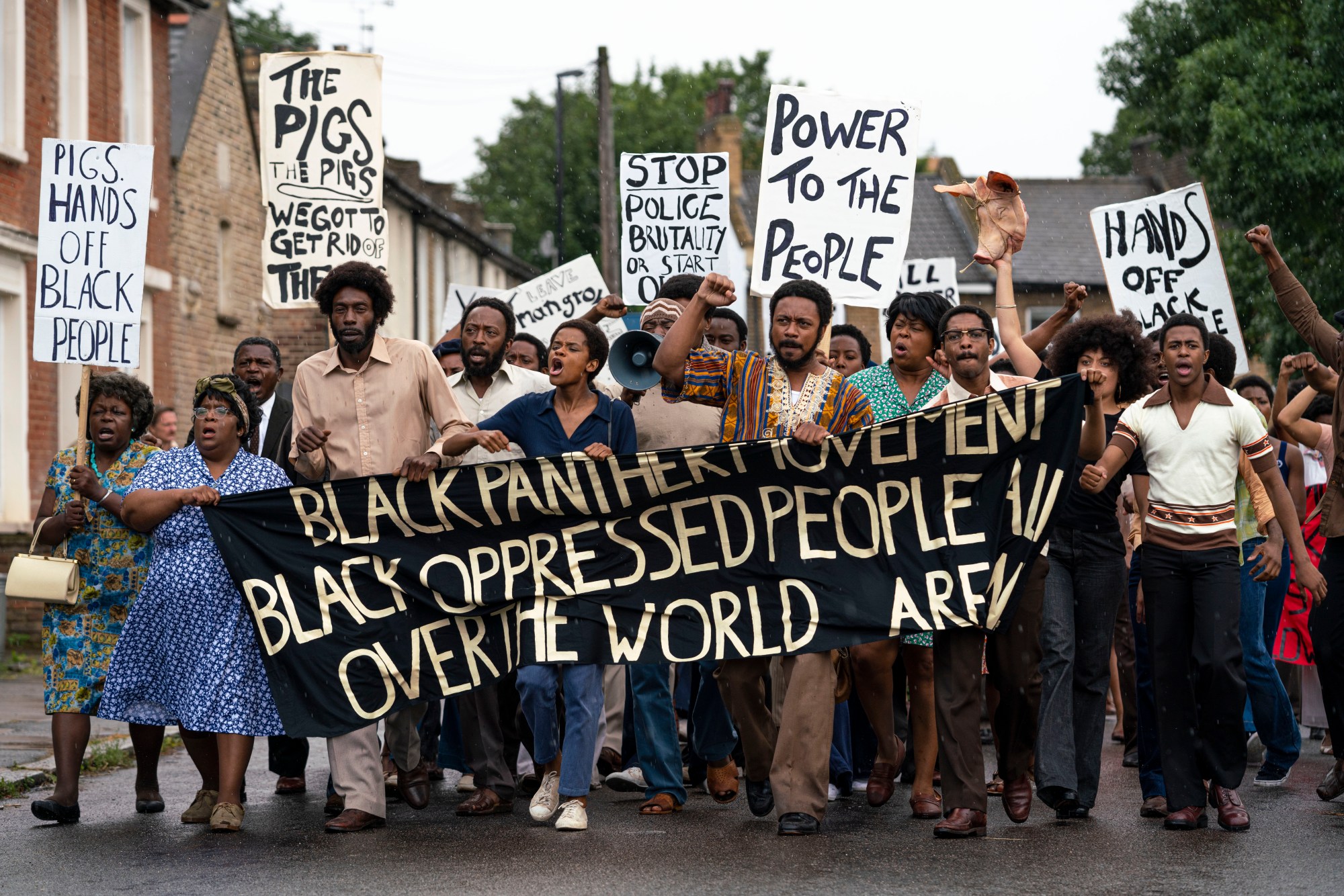Mangrove is a protest film for the ages, one that admires the organised anger of Black people in late 1960s Britain. Part of the Small Axe anthology series for the BBC, it was directed by Oscar-winning Steve McQueen, the filmmaker behind Widows, 12 Years a Slave and Hunger. Born in West London and of Trinidadian and Grenadian heritage, McQueen takes this opportunity to illuminate the rich history of West Indian life in London through the decades.
Starting with the true story of the Mangrove Nine trial in 1969, we journey through Lover’s Rock house parties, learn about the complex lives of Black police officer Leroy Logan and then Brixton Bard Alex Wheatle, before ending on a story about a young boy named Kingsley and the injustices of our education system. Through Mangrove in particular, McQueen demonstrates how anger is not only holy, but how it functions as a visceral response to suffocation and denial; a mission for justice and a necessary force in tandem with hope.
The framing of racism as a uniquely American problem and not a British export is insidious. Britain has a long investment in anti-Blackness which is partly evident in the fact our stories haven’t been told on such a grand scale until now.
The first act of the film transports us to the pressure cooker of Black life in 1960s Notting Hill, specifically that of Mangrove restaurant owner Frank Crichlow (played by Shaun Parkes), through which we bear witness to the resilient and joyous Black community around him. The sign he places in the window of the restaurant, one that reads “Black Ownership”, is not there to signify the activism du jour, but to communicate a message of safety to other West Indians. Soon, the raucous, familial scenes in the restaurant are abruptly cut short by police violence and constant raids. Steve McQueen acutely illustrates the anxieties and indignities of living like prey in your own home, and it is at times exhausting to witness.
In one scene, when a rookie officer is commanded to hunt for a Black person to arrest as part of his indoctrination into the force, McQueen and cinematographer Shabier Kirchner unfurl a horror sequence before us. We watch as the officer emerges from the pitch black, sprinting full speed towards an anonymous young Black man, camera left static on the roof of the police car. From its perspective, we’re left to survey the terror from a distance.
In Milton Bryan’s 1986 documentary, The People’s Account, this act was recognised as “n*gger hunting”. It was identified as a common sport in the Metropolitan Police department.
The subsequent scene in the police station is equally as horrifying: the young man chased down by the officer is no longer anonymous as his mother arrives at the station to report him missing. The officers are contemptuously indifferent to her wailing at the sight of her son’s battered face. One asks the other if he’d like a cup of tea.
Through Frank, we watch the blistering effects of injustice mutate within a person. He becomes furious, then eventually defeated. It is the collective effort of the British Black Panthers that persuade Frank — a restaurant owner, not an activist — to keep going. In reasonable response to the persecution of the Mangrove restaurant, Panthers Altheia Jones-LeCointe (played by Black Panther’s Letitia Wright), Darcus Howe (Malachi Kirby) and Barbara Beese (Rochenda Sandall) among others, organise a peaceful demonstration that results in them being charged with Riot and Affray and put to trial at the Old Bailey. The second act of the film focuses on the claustrophobic 55-day-long Mangrove Nine trial.

The scenes at the demonstration are deeply emotional. There are defiant chants of “Hands off Black People” by protestors who are outnumbered almost three to one by the police surrounding them. Darcus and Altheia awe the crowd with moving speeches of justice and hope; Barbara with a pig’s head on a stick.
Unlike other recent portrayals of the British Black Panther movement, Steve shows Black women at the forefront, where they always had been. Letitia Wright’s restrained and captivating Altheia is a perfect foil to Rochenda Sandall’s more exuberant Barbara. They are different manifestations of anger and resistance. It’s through these two women that McQueen is able to tease out complex intra-community issues.
Our introduction to Altheia, and later her pivotal cross examination scene in the courtroom, pinpoint fractures in the idea of political Blackness, or Black as an encompassing term for those labeled ‘non-white’. The flattening of Blackness to mean anyone non-white makes ‘Black’ synonymous with ‘victim of white supremacy’, and the idea that discussions of difference equals division will never yield fruitful results.

Through Barbara’s outbursts, her insecurities surrounding belonging and identity are revealed. In an early scene, she lashes out at her partner Darcus, who moved from Trinidad to study law in the UK, for suggesting she teach nursery children about the life of Trinidadian historian C.L.R. James. Darcus’ lofty words and comfortability with his heritage trigger the pain and envy within Barbara, who grew up as an untethered minority in the British foster care system, deemed “too negroid” for adoption. Black and Biracial children are still overrepresented in care homes today, and it’s Barbara’s anger at her own treatment and fear her son will face the same fate that drives her. The subtle acknowledgement of these tensions within the film points to a framework of how to recognise our own skewed perspectives, and how vital that is to bring us closer to effective collective action.
When the film enters the courtroom, we are introduced to the good-humoured Glaswegian lawyer Ian MacDonald (Dunkirk’s Jack Lowden). If this was a typical Oscar-bait film chronicling the plight of Blackness, he would be framed as the hero. Initial responses to Mangrove called it a courtroom drama, and though not entirely inaccurate, you can’t help but wonder if perhaps some audience members only started to pay attention when the good-natured white man arrives. But it is the Panthers’ protest throughout; it is Frank Crichlow’s growth and reckoning with faith in the establishment versus faith in his community that truly shape Mangrove. True to the words of Altheia, Steve is insistent that “we mustn’t be victims, but protagonists in our own stories”.

There is a scene in which Frank Crichlow is wrongfully thrown in a cell during court recess. Kirchner’s camera gazes up at him, deifying this figure, as the light from the cell window floods in from above, obscuring his face. ‘Wicked! You people are wicked!” he rages, spitting and hollering at the guard peering in at him, emotionless through the peephole. In this moment, Frank is anointed, his anger overflowing.
But we know that anger without a disciplined hope for change will exhaust you; that anger without a community to keep you alight will burn you out. In Mangrove, Steve McQueen illustrates the profound need for collective fire. There is a poster, hung upon the wall of the restaurant naming those who fought in court for their voices to be heard. It reads: “Black oppressed people all over the world are one”. Today, this sentiment still rings true.

